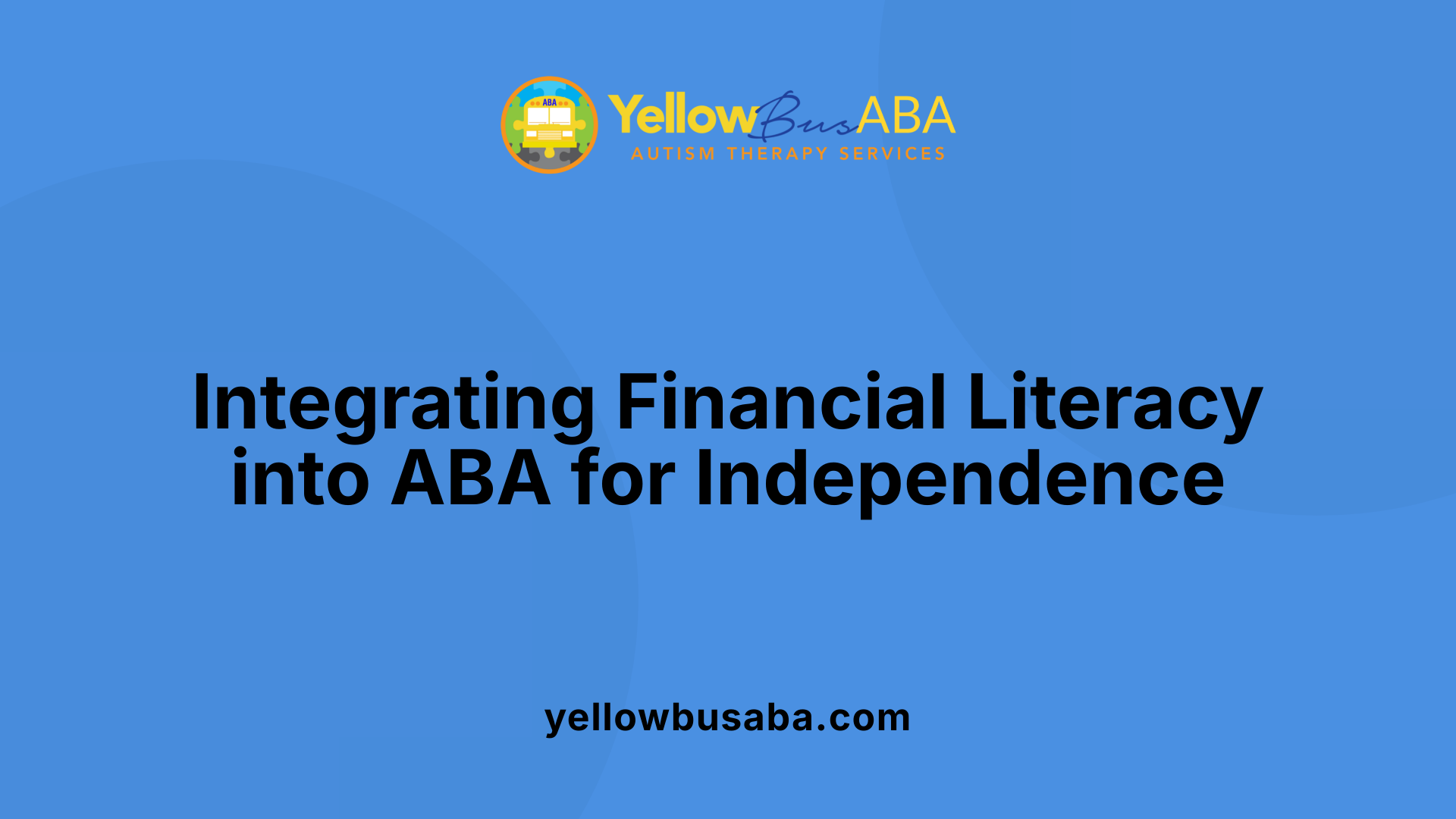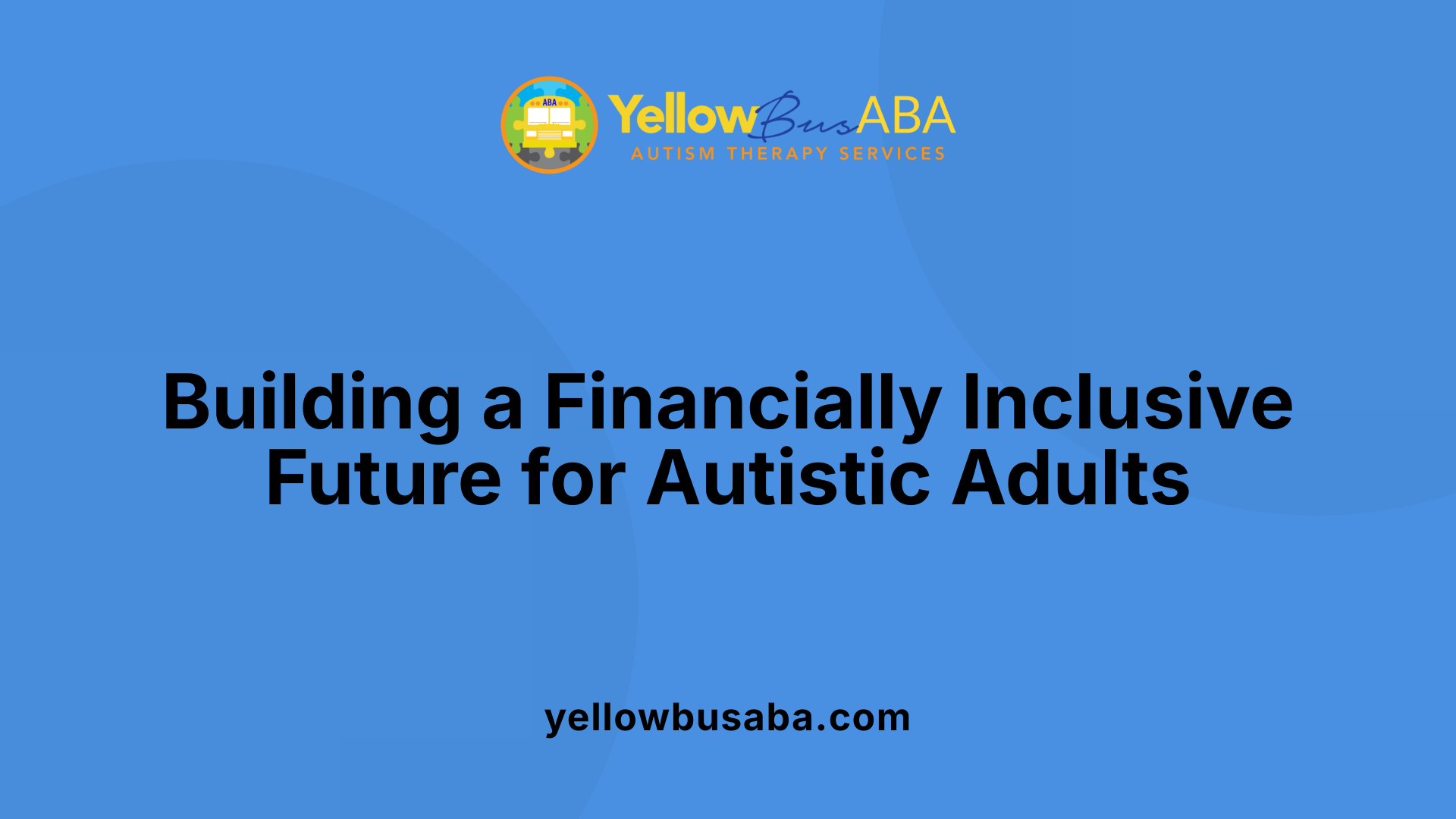Understanding the Intersection of Autism, Financial Literacy, and Therapy
Building financial literacy in young adults with autism is a vital component of fostering independence and improving quality of life. Given that autism spectrum disorder affects communication, social interaction, and behavior, tailored approaches are essential to equip these individuals with the necessary skills for managing money, making financial decisions, and navigating banking systems. While therapies often emphasize verbal and social skills, increasing attention is being directed toward financial education, recognizing its crucial role in adult independence. This article explores how ABA therapy specifically supports the development of financial literacy, the methods employed, available resources, and systemic strategies to bridge existing gaps.
Integrating Financial Education within ABA Therapy Frameworks

Why is financial literacy important for young adults, including those with autism?
Financial literacy plays a vital role in the life of every young adult, especially for individuals with autism. It helps them achieve independence by enabling effective management of personal finances, such as budgeting, saving, and understanding banking services. For autistic individuals, acquiring these skills can lead to improved confidence and reduced anxiety when dealing with financial tasks like opening a bank account or paying bills.
Tailored learning strategies are essential to meet the unique needs of young adults with autism. Visual supports, hands-on activities, and real-life scenarios make complex concepts more approachable and engaging. For example, using visual aids such as charts and automatic calculations in budgeting apps helps them grasp financial concepts with clarity.
Financial literacy is also crucial for long-term stability. It helps safeguard income, plan for emergencies, and avoid pitfalls like unnecessary debt. Early financial education promotes better economic outcomes, supports transition into adulthood, and fosters overall well-being.
How does ABA support the development of financial literacy skills?
Applied Behavior Analysis (ABA) can be a powerful tool in teaching financial skills to young adults with autism. ABA strategies can include direct instruction on money management, practicing budgeting through structured activities, and teaching decision-making skills relevant to financial contexts.
Incorporating financial education into ABA therapy ensures that learning is systematic and tailored to the individual's needs. Visual aids such as charts, countdown timers, and role-playing exercises make abstract financial concepts tangible. Hands-on activities like paying for items, setting up bank accounts, or managing mock transactions provide practical experience.
Early and ongoing intervention is essential. Parents and caregivers play a key role by helping children pay for items, set up accounts, and monitor financial practices at home. ABA programs can include training parents as well, ensuring consistency and reinforcement of skills.
Some ABA programs also address systemic challenges like unfamiliarity with digital banking platforms. Strategies to introduce and familiarize young adults with online banking apps, automated payments, and digital security can decrease anxiety and increase independence.
By integrating financial literacy into ABA therapy, practitioners help promote autonomy and resilience in young adults with autism. This approach aligns with the broader goal of supporting transition into successful, independent adult lives.
| Aspect | Intervention Strategies | Expected Outcomes |
|---|---|---|
| Basic Money Skills | Role-playing, visual supports, real-life practice | Ability to recognize coins and bills, understanding of basic transactions |
| Banking and Saving | Setting up accounts, simulated deposit and withdrawal activities | Confidence in navigating banking services, understanding savings importance |
| Budgeting & Planning | Using apps, visual charts, practice creating budgets | Ability to plan expenses, control spending, and save for goals |
| Decision-Making | Scenario-based teaching, choice exercises | Improved judgment and confidence in financial decisions |
| Digital Banking | Guided introduction to online platforms, security practices | Competence and comfort with digital financial tools |
Overall, ABA therapy offers a structured, tailored approach to develop financial skills, which supports independence and prepares young adults with autism for successful financial management.
| Concept | Teaching Method | Benefit |
|---|---|---|
| Recognition of money | Visual aids, hands-on activities | Enhances understanding and recall |
| Account management | Simulated environments, guided practice | Builds confidence and independence |
| Budgeting | Apps with visual supports, real-life scenarios | Develops planning skills |
| Online banking | Systematic introduction, supportive coaching | Reduces anxiety, promotes digital literacy |
| Managing debt | Education on borrowing, cautious practices | Prevents financial pitfalls |
In summary, combining ABA strategies with tailored financial education equips young adults with autism with the knowledge and skills necessary for financial independence, ultimately contributing to their overall quality of life and successful adulthood.
Effective Strategies and Techniques in ABA for Financial Skills

What methods and strategies are used in ABA therapy to promote financial literacy among young adults with autism?
Applied Behavior Analysis (ABA) employs a variety of targeted approaches to teach financial skills to young adults with autism. Visual aids, such as apps like MagnusCards and EveryDollar, help illustrate budgeting and spending concepts clearly. Hands-on activities, including role-playing banking scenarios and real-life simulations, make learning practical and engaging.
Therapists break down complex financial tasks into smaller, manageable steps, ensuring that learners can master each aspect before progressing. Role-playing conversations about saving, spending, and making financial decisions helps build communication skills and confidence.
Additionally, social stories and video modeling provide context and expectations around financial behaviors, preparing individuals for real-world situations like visiting a bank or managing a budget.
Implementing positive reinforcement—offering praise or rewards—encourages the repetition of desired behaviors and motivates continuous learning. Personalized programs are adapted according to individual strengths and needs, ensuring effective skill acquisition.
Community programs such as summer camps and residential support initiatives often include group activities that focus on real-life financial tasks. These activities facilitate generalization, helping young adults apply learned skills outside structured settings and develop independence.
What systemic and environmental adaptations can aid learning?
Creating autism-friendly financial environments plays a significant role in reducing anxiety and making financial learning more accessible. Many financial institutions, including Regions Bank and Lloyds Banking Group, have developed sensory-friendly spaces and trained staff to support customers with autism.
Using online banking platforms with guided tutorials allows for private practice and self-paced learning, essential for those who experience social pressure or sensory overload during face-to-face visits. Visualization tools like charts and apps with visual interfaces—showing graphs and automatic calculations—aid understanding of complex concepts like budgeting and saving.
Structured routines, clear step-by-step instructions, and consistent reinforcement help learners develop routines that promote independence. Setting up systems where young adults practice by managing small expenses or paying bills with supervision helps build confidence and competence.
Incorporating these environmental modifications creates a supportive framework that emphasizes both skill mastery and comfort, fostering a positive learning experience for young adults with autism.
Resources, Tools, and Support Systems for Financial Literacy Development

What educational resources are available for developing financial skills in young adults with autism?
A variety of educational tools and resources are designed to help young adults with autism acquire essential financial skills. These include specialized curricula, workbooks, and digital platforms that present financial concepts in an engaging, accessible way. Reputable organizations such as Autism Speaks offer comprehensive toolkits and online modules like Hands on Banking and Everfi, which feature tailored guidance on budgeting, savings, understanding government benefits, and planning for the future.
Visual aids and interactive apps play a vital role in teaching money management. Applications like EveryDollar, MagnusCards, and the Autism Speaks Financial Planning App use graphics, step-by-step instructions, and real-life scenarios to make learning more concrete. These tools are complemented by community resources such as sensory-friendly banks and online banking services, which help young adults practice real-world finance in a low-stress environment.
Early financial education is crucial. Hands-on activities, real-life scenarios, and community programs foster confidence and independence. Engaging with these educational resources can lay a strong foundation for managing personal finances, preparing young adults with autism for a more autonomous and secure future.
How do government programs contribute to financial literacy?
Government initiatives like Medicaid, Social Security Income (SSI), and ABLE accounts play a significant role in supporting the financial stability of autistic individuals. These programs provide crucial benefits that help cover healthcare, living expenses, and savings opportunities without risking eligibility for other support. The ABLE account, in particular, allows individuals to save money tax-free for important expenses while maintaining their government benefits.
Supporting these benefits with educational resources is essential. Organizations and community services offer informational materials, application assistance, and financial planning guidance to help families and individuals understand and manage these programs effectively. Learning how to navigate and maximize government benefits is an important aspect of fostering financial independence and ensuring long-term stability for young adults with autism.
Policy and Community Support for Financial Literacy and Independence

What systemic and policy initiatives support financial literacy for autistic adults?
Efforts to enhance financial literacy among autistic adults include both policy measures and community-driven programs. Current policies focus on making banking services more accessible, such as creating sensory-friendly environments and training staff to better serve individuals with autism. Some banks, like Regions Bank and Lloyds Banking Group, have launched specialized spaces and processes to aid individuals with ASD.
Structured programs, such as New Directions, play a crucial role. These programs provide weekly financial counseling, helping young adults set budgets, open bank accounts, and develop independence using real-life scenarios. They also assist families in establishing financial plans and resources, guiding them through government benefits like Medicaid, SSI, and ABLE accounts.
Policy recommendations emphasize making federal assistance programs more inclusive through revising eligibility criteria, asset limits, and expanding financial education access. Community initiatives, including transition planning within schools and local agencies, support ongoing development of financial skills.
By combining regulations, educational programs, and community collaborations, these systemic efforts seek to bridge service gaps, reduce financial risks, and promote economic stability for autistic adults. Such initiatives are essential for empowering individuals to manage money confidently and independently in their daily lives.
Charting a Path Toward Financial Independence
Integrating financial literacy training within ABA therapy and leveraging community and policy initiatives are fundamental steps toward empowering young adults with autism. By combining tailored educational methods, accessible resources, and systemic support, we can bridge existing gaps and enable these individuals to manage their finances confidently and independently. Building stronger financial skills today paves the way for a more autonomous, secure, and fulfilling life in the future.
References
- Developing Financial Skills in Kids with Autism - Alsop Elder Law
- Learning Financial Literacy Empowers Young Adults with Autism
- [PDF] Money Management for Young Adults with Autism - CSESA
- Bridging the Gap Enhancing Financial Literacy for Autistic Adults
- Financial Skills Development - New Directions for Young Adults
- Financial capability and functional financial literacy in young adults ...
- How to Set Up Your Young Adult for Financial Independence






